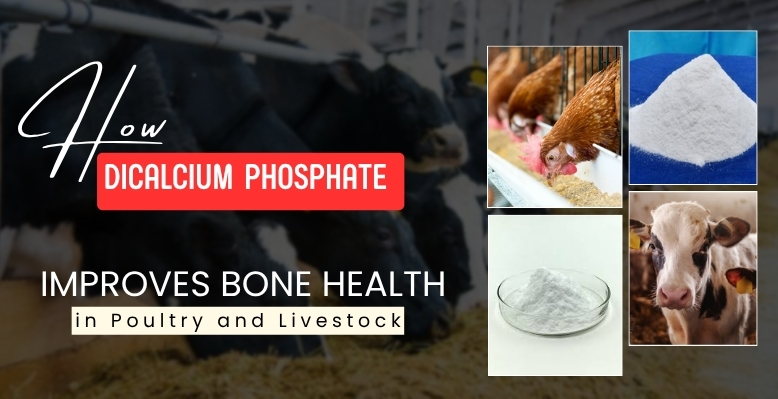
How Dicalcium Phosphate Improves Bone Health in Poultry and Livestock
Maintaining strong bones and optimal growth in poultry and livestock is vital for achieving high productivity and overall animal well-being. Among the various feed additives used in animal nutrition, Dicalcium Phosphate (DCP) plays a key role in promoting bone strength, growth, and performance. This essential supplement provides the necessary calcium and phosphorus that animals require for skeletal development and metabolic functions. In this blog, we’ll explore how dicalcium phosphate for poultry health and livestock nutrition works, its benefits, and why it’s a preferred choice in modern farming.
What is dicalcium phosphate?
Dicalcium Phosphate (DCP) is an easily digestible source of both calcium and phosphorus, which are two significant minerals in the formation of bone and metabolic processes. DCP is produced by the reaction of phosphate rock and calcium carbonate, with acid, purified and dried.
DCP in animal feed guarantees a balanced supply of dietary calcium and phosphorus, which are ultimately required for skeletal development, eggshell formation, and good growth rates in livestock and poultry.
The Importance of Calcium and Phosphorus in Animal Nutrition
Calcium and phosphorus are among the most crucial minerals for animal health:
- Calcium: supports bone structure, eggshell strength, and muscle function.
- Phosphorus plays a major role in energy metabolism, cell growth, and bone mineralization.
When these two minerals are not present in the correct ratio, it can lead to weak bones, poor growth, reduced productivity, and health disorders. Supplementing calcium phosphate in animal feed ensures animals receive the right balance for efficient nutrient absorption and utilization.
How Dicalcium Phosphate Benefits Bone Health in Poultry Farming
In poultry farming, maintaining bone health is essential for supporting the birds’ weight, movement, and egg production. Here’s how DCP contributes to better bone health:
- Promotes Strong Skeletal Development: DCP provides an ideal ratio of calcium and phosphorus, helping birds develop strong and dense bones. This reduces the risk of leg deformities and fractures, especially in fast-growing broiler chickens.
- Enhances Eggshell Quality: Laying hens require high calcium levels to produce tough, durable eggshells. DCP ensures consistent calcium availability, resulting in better shell strength and reduced egg breakage.
- Improves Growth and Feed Efficiency: Adequate mineral supply through DCP allows better feed conversion and nutrient absorption. Birds grow uniformly and reach market weight faster, reducing feed costs and boosting farm profitability.
- Prevents Nutritional Deficiencies: A lack of phosphorus or calcium can lead to rickets and poor bone density. Supplementing dicalcium phosphate for poultry health prevents such deficiencies and supports normal physiological processes.
Benefits of Dicalcium Phosphate for Livestock
Livestock such as cattle, goats, sheep, and pigs also benefit significantly from DCP supplementation:
- Stronger Bones and Teeth: Ensures skeletal integrity and prevents conditions like osteomalacia.
- Better Reproduction: Adequate phosphorus levels improve fertility and conception rates.
- Improved Milk Production: Calcium and phosphorus enhance milk yield and quality in dairy cattle.
- Optimized Weight Gain: Healthy metabolism and efficient energy utilization contribute to better growth performance.
By adding calcium phosphate in animal feed, farmers can achieve balanced nutrition, promoting animal vitality and long-term productivity.
Choosing the Right Dicalcium Phosphate for Animal Feed
When selecting DCP for your feed formulations, consider the following:
- Purity and Solubility: High-quality DCP should be free from impurities and easily soluble to ensure proper nutrient absorption.
- Feed Compatibility: It should blend well with other feed ingredients without affecting taste or texture.
- Source Reliability: Choose a reputable dicalcium phosphate supplier known for consistent quality and purity.
Dosage and Feeding Recommendations
The required DCP amount depends on the animal species, age, and growth stage.
- Broilers: 0.9–1.2% of total feed
- Layers: 1.0–1.5% for strong eggshells
- Cattle: 30–50 grams per day per head (depending on diet and production stage)
Consulting a qualified veterinarian or animal nutritionist helps determine the correct dosage to prevent over- or under-supplementation.
Conclusion
Dicalcium Phosphate is a crucial part of balanced animal nutrition. It delivers easily digestible forms of calcium and phosphorus for optimal bone health in poultry and livestock production. Regardless of whether you operate a large commercial poultry enterprise or a dairy farm, adding calcium phosphate to animal feed ensures animal health, productivity, and profit.
HTMC Group provides dicalcium phosphate for poultry health and livestock nutrition that is rigorously high-quality. The HTMC Group is a quality-based name you can trust for premium feed supplements in the agriculture and nutrition of animals category.
Frequently Asked Questions
Q1. What is Dicalcium Phosphate and why is it used in animal feed?
Dicalcium Phosphate (DCP) is a mineral supplement containing calcium and phosphorus. It’s added to animal feed to improve bone health, growth, and overall productivity in poultry and livestock.
Q2. How does dicalcium phosphate improve bone health in poultry?
DCP provides the ideal ratio of calcium and phosphorus essential for bone development. It helps prevent leg deformities, supports skeletal strength, and enhances eggshell quality in layers.
Q3. Is dicalcium phosphate safe for all livestock animals?
Yes, dicalcium phosphate is safe and widely used in feed for cattle, goats, sheep, pigs, and poultry when added in the recommended quantities.
Q4. What happens if animals do not get enough calcium and phosphorus?
Deficiency of these minerals can cause weak bones, poor growth, low egg production, and skeletal deformities. Supplementing with dicalcium phosphate helps prevent these issues.
Q5. Where can I buy high-quality dicalcium phosphate for poultry health?
You can source premium-quality dicalcium phosphate for poultry and livestock nutrition from HTMC Group, a trusted supplier of animal feed supplements.